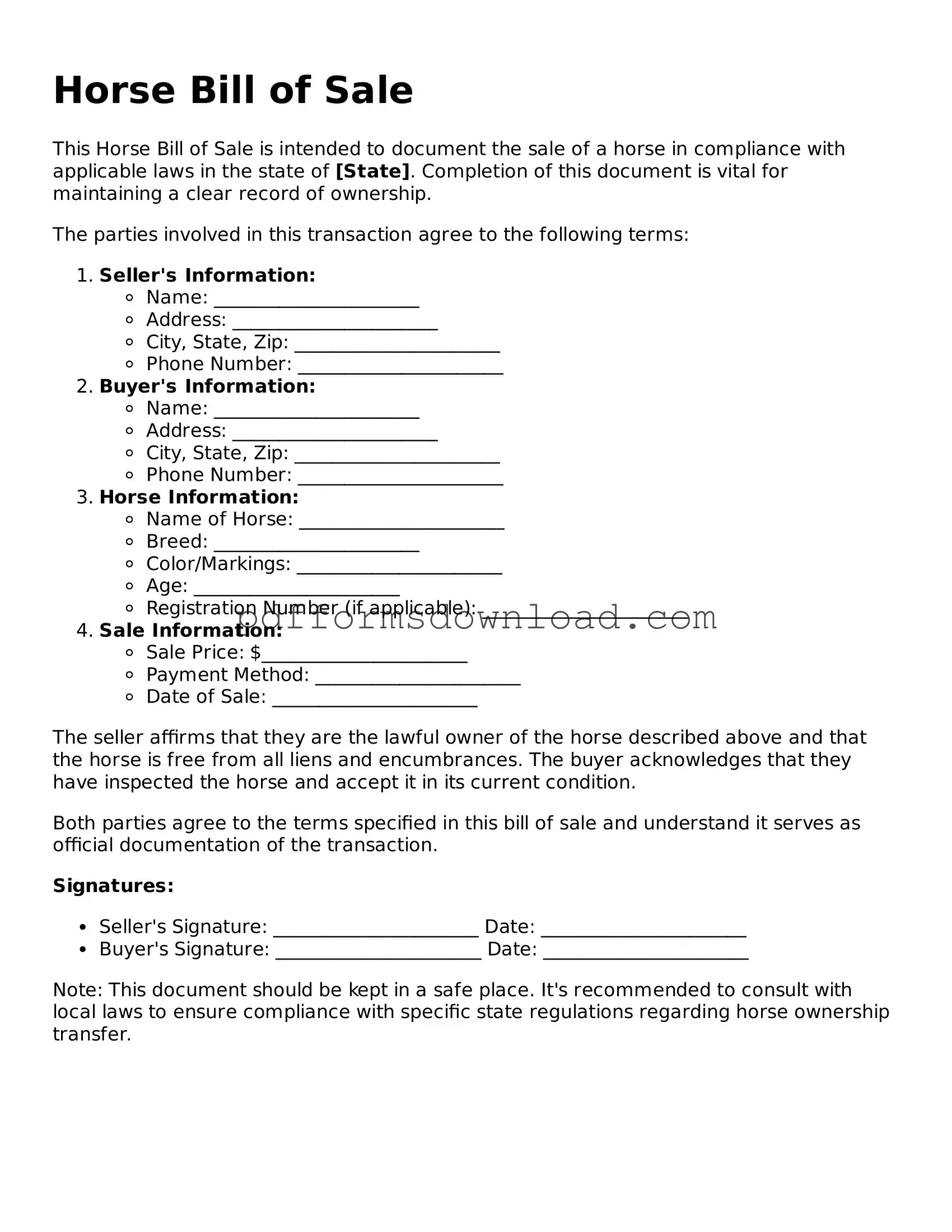What is a Horse Bill of Sale?
A Horse Bill of Sale is a legal document that outlines the sale transaction of a horse. It serves as proof of ownership transfer from the seller to the buyer. This document typically includes details about the horse, such as its breed, age, and registration number, as well as the sale price and date of the transaction.
Why is a Horse Bill of Sale important?
This document is essential for several reasons. It protects both the buyer and the seller by clearly defining the terms of the sale. It helps prevent disputes over ownership and provides a record of the transaction for future reference. Additionally, it may be required for registration or insurance purposes.
What information should be included in a Horse Bill of Sale?
A comprehensive Horse Bill of Sale should include the following details: the names and addresses of both the buyer and seller, a description of the horse (including breed, age, color, and any identifying marks), the sale price, the date of the sale, and any warranties or guarantees provided by the seller. It is also advisable to include signatures from both parties.
Do I need to have the Horse Bill of Sale notarized?
Notarization is not always required, but it can add an extra layer of security to the document. Having a notary public witness the signing of the Horse Bill of Sale can help verify the identities of both parties and the authenticity of the agreement. Some states may have specific requirements regarding notarization, so it's wise to check local laws.
Can a Horse Bill of Sale be used for other types of livestock?
While a Horse Bill of Sale is specifically designed for horses, similar documents can be used for other types of livestock. However, it is important to ensure that the document is tailored to the specific type of animal being sold, as details may vary between species.
What happens if there is a dispute after the sale?
If a dispute arises after the sale, the Horse Bill of Sale can serve as critical evidence in resolving the issue. It is essential to keep a copy of the document, as it outlines the terms agreed upon by both parties. Depending on the nature of the dispute, legal action may be necessary, and having a well-documented sale can support your case.
Is a Horse Bill of Sale legally binding?
Yes, a Horse Bill of Sale is a legally binding contract as long as it meets the necessary requirements, such as the consent of both parties and the inclusion of essential terms. Both the buyer and seller are obligated to adhere to the terms outlined in the document once it is signed.
Can I create my own Horse Bill of Sale?
You can create your own Horse Bill of Sale, but it is crucial to ensure that it includes all necessary information and complies with state laws. Many templates are available online, which can serve as a helpful guide. However, it may be beneficial to consult with a legal professional to ensure that the document is valid and enforceable.
What should I do if the horse has health issues?
If the horse has known health issues, it is important to disclose this information in the Horse Bill of Sale. Transparency is key to maintaining trust between the buyer and seller. You may also consider including a clause that addresses any warranties regarding the horse's health, which can help protect both parties in the event of future issues.
How can I ensure a smooth transaction when selling a horse?
To ensure a smooth transaction, both parties should communicate openly and clearly about the terms of the sale. It is advisable to conduct a pre-sale inspection of the horse and provide any relevant health records. Completing a Horse Bill of Sale that accurately reflects the agreement will also help facilitate a successful transfer of ownership.

